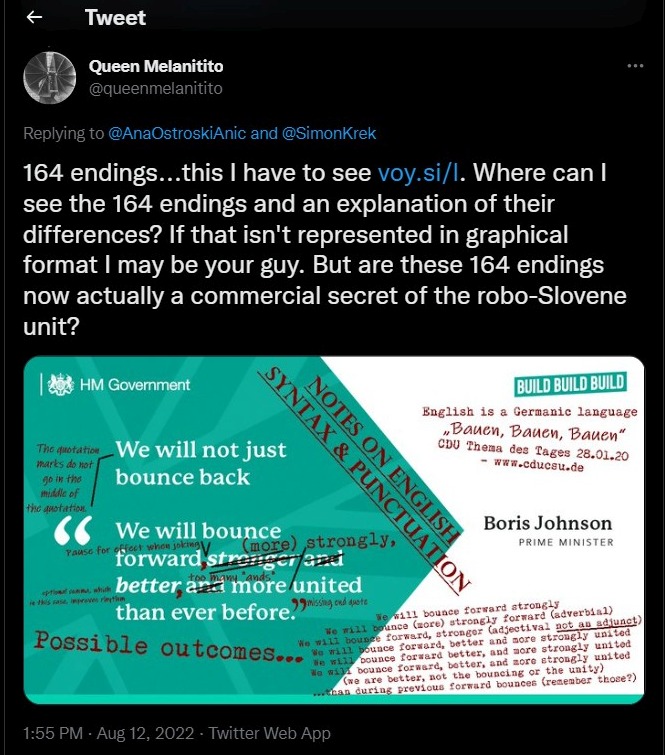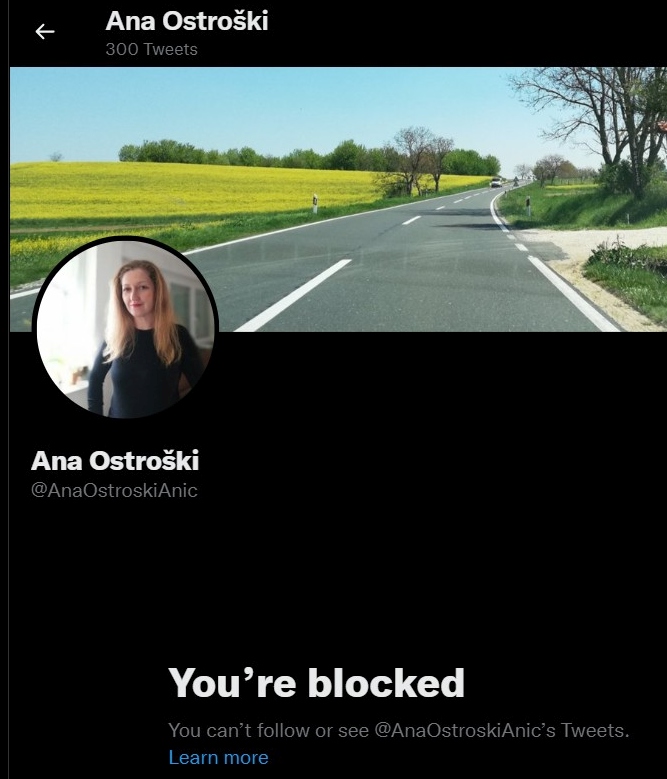

THE BIGGER LOSER
What if the would-be student of Slovene, immersed in Ptuj society, is simply unable to overpower the
latest three
or four people, competing on the clock to be hospitable by saving him the
trouble of speaking any Slovene?
The Complainant could also claim to have a loss; €30 from an hour of being prevented from acquiring any Slovene, and €30 per barnacle.
So €120-€150
for three or four. This, after all, is what LUP/ZRSZ
is
waiting for.
These notional losses are further magnified: firstly by an indeterminate amount
for free information not strictly part of the free English lesson, including all
the things the Slovenians didn't know they didn't know.
And secondly
by the loss of any possibility of profit in the future due to his unextended knowledge of
Slovene, also indeterminable.
The total remains notional, but the loss to the Complainant is real.
Lacking the guile of the desperate, and far from the capital, he has been fed
upon, barely suspecting he was in a transactional situation at all!
Such is the strength of this antigravitational push away from Slovene, it bears
asking whether Anglophone tourists should pay to stay in Slovenia, or be paid
for their interesting and potentially profitable presence.
Hospitality can never transition, because nobody spends a "normal" conversation
explaining about cases and endings. Enquiries about word order and idioms are
met with put-offs or blank stares. The idea that dvojina represents about 99%
of what you need to know to speak Slovene, and ridicuously detailed tales of
different ways to pronounce a vowel or describe an object in certain villages,
belittling to the elementary student, are popular amusements in pub Slovene, as
well as foreigner-baiting. All Slovene takes place at full throttle, while the
syllabic prosody does not help the novice ear identify word breaks.
The World Atlas of Language Structures identifies the rhythm of Slovene as
"absent: no rhythmic stress". In this respect it is like Swedish or Pashto, not
trochaic like English, German, Hungarian and Cornish, nor iambic like Cebuano or
Winnebago. Nor is Slovene's rhythm a combination of those, like Wichita and
Yuwaalaraay.
Slovene has no fixed stress [28].
Slovene has unbounded stress: stress can be anywhere. Stress in English is right-oriented, in the last three syllables [46].
In Europe there is a north-south divide concerning "prominence" - the effect of melody and vowel aperture on syllable weight [69]
To the dominant WEIRD (Western Educated
Industrialized Rich and Democratic) ear Slovene is one of the monotonous, burbling
languages. However, in terms of actual weirdness, Slovene is nearer to the mean
for all language characteristics, less weird than English (33rd in the weirdness
index), while German is the biggest outlier among the "big" languages and 10th
weirdest overall.
The methodology of the WALS comparison - although the data was too sparse for
many of the little languages - defeats the Anglocentric view of the world by
scoring 192 features, or linguistic components [4].
The word monotonous, of course, comes from "monotone". Monotonous voices are
less attention-grabbing and the content therefore harder to learn. Register,
timbre, prosody, pace, pitch and volume are voice components which vary between
languages and between individuals [100].
Slovenes may think in words, but it doesn't sound like it. Being unaware a
sentence in Slovene sounds like one long word to the Complainant, they should
break them up a lot while the student picks up speed.
Another WALS map, different from the others, addresses a particular lexical
concept: tea. It is used to demonstrate the movement of language and
"shows the importance of long-distance contacts, such as the trade relations
between European countries and East Asia, and is thus a healthy reminder of the
fact that languages need not be geographically contiguous to influence each
other." [81 and see link to chapter 138]
In this Slovenia and the southern Balkans join Czechoslovakia in demonstrating
their impermeability to maritime influence. Dutch tea traders bought at Fujian,
bringing the word "thee" from the Min Yan Chinese spoken there. Whereas only a
handful of languages in western Europe, whose owners got their tea overland
rather than from the Dutch, tend to use forms such as "čaj", from Sinitic
Chinese [81].
Assembling a novel vocabulary in an unusual order, agglutinating as you go, is like learning a tune on the piano. First you go slowly. Then, as you put the phrases together, more quickly. The person you are copying must start slowly too.
As we know, there exists no one in Slovenia that can do this, without regaining full speed by the second sentence. And why should they? Another way of dealing with this would be to not have anti-foreigner language laws.
This, the Complainant asserts, is a major obstacle to vocalisation and the reason his initially willing, but as it turned out compulsory and unavoidable reliance upon immersion learning proved to be a mistake.
According to Wikipedia's extensive page on the Styria/Štaerska dialects:
"Among other features, this group is characterized by loss of pitch accent, tonemically high and lengthened accented syllables, lengthening of accented short syllables, and frequent development of [special characters!] *a > o̧̧, and *u > ü in the eastern part of the territory."
While the Pannonian dialect, also spoken in Eastern Štaerska:
"is characterized by loss of pitch accent, non-lengthened short syllables, and a new acute on short syllables."[91]
All this so people can spit on you in Ljubljana for speaking Ptuj's version, and vice versa. Lest we forget, intelligibility is the law, and no one speaks Standard Slovene.
While the new student ponders his next move on these abstruse issues, no framework for the appropriate words to choose for making, doing, saying, and being can be winkled out of the autochthons, from among the numerous options available. It's all a huge laugh.
Whichever you choose will elicit surprise, as if this is the first time something has ever been said this way. As we shall hear in a moment, perhaps it is. But of constructive suggestions there are none. [80]
Besides following the dicta of ZJRS 13 and the Decree on the Integration of Aliens, another way of dealing with this difficulty would be to not have anti-foreigner language laws.
It can be argued that English has a very simple morphology compared to Slovene and that Slovenians learning it have little need to understand the parts of speech, and never experience what the Anglophone has to go through to gain any systematic understanding of European languages.
In better news, Slovene is one of only 57 LOL languages - Literate, Official, and with Lots of users - out of 2676 in the WALS database [18].
A 2022 Report on the Slovenian Language by Simon Krek [66] exceeds my calculation of 72 possible endings [67], showing what can go wrong when victims of the anti-non-Slovenianness laws and administrative practices are left to work it out for themselves:
"Slovene nouns also show six grammatical cases and three genders with several inflectional paradigms which leads to an explosion of different inflectional forms. The situation is even more complex with adjectives which – in addition to case, number and gender – can also express degree and definiteness. One single Slovene adjective pameten can therefore show no less than 164 different inflected forms where English, for instance, would only have three: 'wise', 'wiser', 'wisest'."
Enclosing his credentials, the Complainant sought further information but without success, as these prefixes and/or endings have been privatised, and an education for learners (but first, Slovenians themselves) would be economically damaging. A typical response was received. Slovenian Twitter is for shouting about communists and homos, not communication. The open lexicography is for members only! [101]
Agglutinated and case-formed Slavic languages are "one step further away" from English than Romance and Germanic in their morphology. Which is the easier learning pathway: agglutinated to non-agglutinated or vice versa? Towards 2˝ hardly visible cases without agreement, or 6 with? Gendered or neutered? Formal/informal or egalitarian? Rhema/thema or SVO? Zero subject...or a subject? Thinking about the ending before you vocalise a word, or not having an ending?
Either transit requires a rethinking of grammatical units and their ordering.
"With the abundance of different inflected forms it is predictable that the language would not be strict in fixing the word order in sentences. As in most of Slavic languages, sentence elements can be permuted and found in almost all positions. However, different possibilities usually imply that different elements will be emphasised in the sentence, a phenomenon sometimes called topicalisation. A simple five-word sentence Eva je Adamu dala jabolko [Eve gave an apple to Adam], composed of a subject, a direct and an indirect object, and a predicator with an auxiliary verb plus a participle forming past tense, can thus produce no less than 120 permutations, some of which are used to make questions, some sound rather odd, some would imply poetic use, but almost all are legitimate in a specific context. All language technology applications for Slovene are affected by these features, particularly by complex morphology and the free word order implying topicalisation issues, together with the rather complex relation between written and spoken language." [66]
Science, meanwhile, supports the notion of sounds, prosody and language units being acquired prenatally, rrrrrrrrrreducing the foreigner's chances of not remaining too illegal to survive.
Any change in the English to Slovene ratio would eat into Slovenia's €30+ per hour
hospitality profits.
Even if it did not really gain, the Anglophone lost. Which to Slovenians feels even better.
From the rabidly racist to the
reasonable reactionary, Slovenians believe you should learn Slovene, that it is "a
must", and that you don't want to. Hospitality makes sure you won't.
Hospitality and hostility are equally good ways of papering over the cracks.
Come the technological revolution in conversational machine translation - which will be in English, so only 41% of Slovenians will need it anyway - ZJRS 14 will be even more of a bigoted relic. [Table 1, 66]